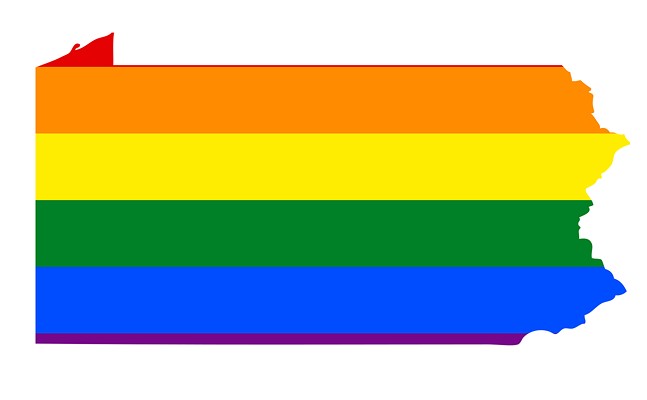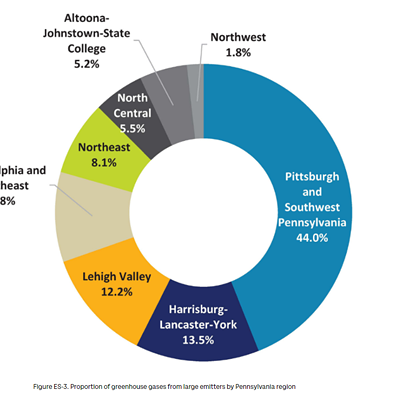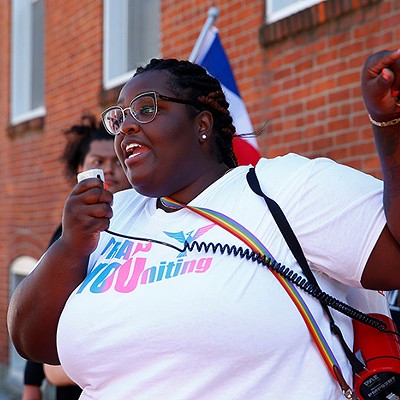Pennsylvania receives lowest rating from national LGBTQ-rights group, again
On Jan. 30, the Human Rights Campaign (HRC) released its fifth annual State Equality Index (SEI) for 2019, and it's not good news for Pennsylvania.
The SEI details statewide laws and policies that affect LGBTQ people and their families, and assesses how well states are protecting LGBTQ people from discrimination. Pennsylvania falls into the lowest-rated category, “High Priority to Achieve Basic Equality,” along with 27 other states including Alabama, Kentucky, Mississippi, and Texas.
According to the press release, LGBTQ individuals and their families living in the lowest-rated states may face discrimination in housing, employment, or public accommodations. This leaves an estimated 8 million Americans at risk. It is still legal in most parts of Pennsylvania to fire, evict, or deny public accommodation to LGBTQ people. Only in local governments, like Allegheny County, do LGBTQ people have the same non-discrimination protections afforded to all other Americans based on race, gender, national origin, and religion.
“In the absence of federal non-discrimination protections for the LGBTQ community, states must put policies in place to ensure equality for their residents, workers, and visitors,” said HRC President Alphonso David in a press release. “In 2020 and beyond, the Human Rights Campaign will continue to work with our partners to defeat anti-LGBTQ legislation in the states and secure new protections for our community, both at the state and federal level.”
Seventeen states and the District of Columbia are in the highest-rated category, “Working Toward Innovative Equality.” States that border Pennsylvania that are included in this category are New York, New Jersey, and Maryland.
The SEI reports that Pennsylvania has laws criminalizing behaviors that carry a “low or negligible risk of HIV transmission,” and because of the commonwealth's Religious Freedom Protection Act of 2002 cited in the report, “people, churches, non-profit organizations, and sometimes corporations can seek exemptions from state laws that burden their religious beliefs.” Often, this may counter non-discrimination laws.
A separate HRC report highlights the specifics of Pennsylvania’s support and lack thereof as it pertains to LGBTQ individuals.
On a state-level, Pennsylvania does not have a law that addresses hate or bias crimes based on sexual orientation and gender identity. Nor does it have a law that addresses harassment and/or bullying of students in schools based on sexual orientation and gender identity.
The state also has no restrictions on conversion therapy, which the reports cite as a “dangerous and discredited practice that falsely claims to change a person’s sexual orientation or gender identity or expression.”
However, a Pittsburgh bill added sexual orientation and gender identity to the city’s non-discrimination law and banned conversion therapy in the city; Allegheny County Council is considering a county-wide measure.
Pennsylvania has, however, made some progress. Second-parent adoption is an option for same-sex parents statewide, and there are laws that facilitate gender marker updates on driver’s licenses and birth certificates.
Pennsylvania collects data on the Behavioral Risk Factor Surveillance System (BRFSS) on the basis of sexual orientation and gender identity, as well as data on the Youth Risk Behavior Surveillance System (YRBSS) on the basis of sexual orientation only. People can also submit discrimination complaints based on sexual orientation and gender identity to Pennsylvania's Human Relations Commission, but those protections are not codified into law.
Statewide bans on insurance exclusion for transgender healthcare are in place, but Pennsylvania does not provide transgender-inclusive health benefits to state employees.
The SEI report offers a state-by-state breakdown, and you can check your state’s scorecard by texting “SEI” to 472472.
The SEI details statewide laws and policies that affect LGBTQ people and their families, and assesses how well states are protecting LGBTQ people from discrimination. Pennsylvania falls into the lowest-rated category, “High Priority to Achieve Basic Equality,” along with 27 other states including Alabama, Kentucky, Mississippi, and Texas.
According to the press release, LGBTQ individuals and their families living in the lowest-rated states may face discrimination in housing, employment, or public accommodations. This leaves an estimated 8 million Americans at risk. It is still legal in most parts of Pennsylvania to fire, evict, or deny public accommodation to LGBTQ people. Only in local governments, like Allegheny County, do LGBTQ people have the same non-discrimination protections afforded to all other Americans based on race, gender, national origin, and religion.
“In the absence of federal non-discrimination protections for the LGBTQ community, states must put policies in place to ensure equality for their residents, workers, and visitors,” said HRC President Alphonso David in a press release. “In 2020 and beyond, the Human Rights Campaign will continue to work with our partners to defeat anti-LGBTQ legislation in the states and secure new protections for our community, both at the state and federal level.”
Seventeen states and the District of Columbia are in the highest-rated category, “Working Toward Innovative Equality.” States that border Pennsylvania that are included in this category are New York, New Jersey, and Maryland.
The SEI reports that Pennsylvania has laws criminalizing behaviors that carry a “low or negligible risk of HIV transmission,” and because of the commonwealth's Religious Freedom Protection Act of 2002 cited in the report, “people, churches, non-profit organizations, and sometimes corporations can seek exemptions from state laws that burden their religious beliefs.” Often, this may counter non-discrimination laws.
A separate HRC report highlights the specifics of Pennsylvania’s support and lack thereof as it pertains to LGBTQ individuals.
On a state-level, Pennsylvania does not have a law that addresses hate or bias crimes based on sexual orientation and gender identity. Nor does it have a law that addresses harassment and/or bullying of students in schools based on sexual orientation and gender identity.
The state also has no restrictions on conversion therapy, which the reports cite as a “dangerous and discredited practice that falsely claims to change a person’s sexual orientation or gender identity or expression.”
However, a Pittsburgh bill added sexual orientation and gender identity to the city’s non-discrimination law and banned conversion therapy in the city; Allegheny County Council is considering a county-wide measure.
Pennsylvania has, however, made some progress. Second-parent adoption is an option for same-sex parents statewide, and there are laws that facilitate gender marker updates on driver’s licenses and birth certificates.
Pennsylvania collects data on the Behavioral Risk Factor Surveillance System (BRFSS) on the basis of sexual orientation and gender identity, as well as data on the Youth Risk Behavior Surveillance System (YRBSS) on the basis of sexual orientation only. People can also submit discrimination complaints based on sexual orientation and gender identity to Pennsylvania's Human Relations Commission, but those protections are not codified into law.
Statewide bans on insurance exclusion for transgender healthcare are in place, but Pennsylvania does not provide transgender-inclusive health benefits to state employees.
The SEI report offers a state-by-state breakdown, and you can check your state’s scorecard by texting “SEI” to 472472.



















